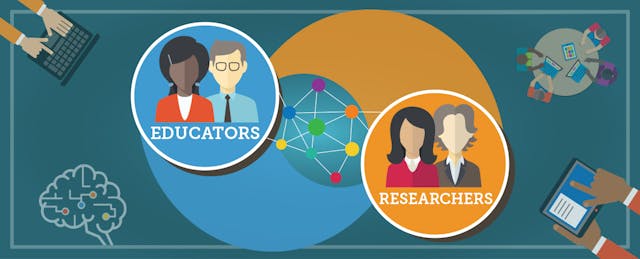What role does data play in developing solutions to complex challenges in education? And how do we know which approaches in what context are effective in the classroom?
As technology use has increased in schools, so has the breadth of innovations aimed at improving learning—for example, by personalizing to the needs of each student. But how are these innovations building on what we know about how people learn? Clearly, innovation without research taps creative energies but misses critical guidance for our best shot at improvement. In order to fully leverage research to improve learning outcomes for all students, we must fundamentally shift the relationship between learning research and educational practice.
Better connecting research and practice is not a new challenge, but it is one that requires renewed focus in an age of rapid, technology-enabled change in education. In order to fully support each and every individual learner, we must ensure that new approaches are based on what we know about how learners vary. And, we must perfect our processes for researchers and practitioners working together on strategies for supporting the full range of learning variability found in today’s schools.
Recent advances in neuroscience, cognitive psychology, computer science, affective science, and many other fields across the learning sciences have provided a great foundation on which new programs and products can be based. For example, we now understand more about individual differences in brain mechanisms involved in the development of new cognitive skills, like reading. We are learning how affect and social engagement are integral to the learning process. Cognitive scientists have organized many findings into major factors that can guide the design of instruction. In addition to these general principles of learning, we know that much of learning happens in ways that are specific to the discipline of math, science, history or literature, and these findings also should be considered.
- First, we must make it easier for practitioners to access research on learning so it can be applied in the classroom. Resources such as the Digital Promise Research Map and LPS Alpha tool, training for teachers about the science of learning, and the Learning Scientists’ six strategies of effective learning can help educators and product developers find and creatively apply research findings in their work. Additional tools that foster two way dialogue between researchers and practitioners are also necessary to help researchers ensure their questions are relevant to educators needs, and help educators implement findings.
- Second, we must facilitate and support research practice partnerships in which researchers and educators collaboratively identify challenges and co-create solutions. Creating research-practice partnerships requires both education researchers and educators to think differently about their professions. They require researchers to relinquish their decision-making about what to study and how to study it. Instead, these decisions should be made in collaboration with the educators who will use the results of the research to improve learning opportunities for students. These partnerships also require educators and education leaders to reconceptualize their jobs—to include time not only to reflect on what they are doing, but also to actively engage in the systems analysis, experimentation, data collection, and analysis needed to improve outcomes. At Digital Promise, for example, we are launching research-practice partnerships that leverage the wealth of data produced when learners interact with digital learning systems.
- Third, we need to find agile, scalable ways to connect research and practice. Innovators and educators are developing new approaches that sometimes reach tens or hundreds of thousands of users within a year; how can research keep pace? Additionally, cycles of product innovation are accelerating through approaches like A/B testing, especially if the data can be clearly interpreted. Finally, districts and companies have new opportunities to effortlessly collect enormous data sets that could yield insights into student learning. But we still don’t know enough about which data to collect and how to analyze it in ways that can meaningfully guide improvement, both in terms of achievement and with regard to engagement, persistence, struggle, pathways and more.
Research Practice Partnerships is an area we’re going to tackle further during the Fusion conference we’re cohosting with EdSurge on Nov. 1 - 3. Our goal is to determine what steps are needed to form symbiotic relationships between educators and researchers. If teachers are armed with the latest learning science and know how to apply it in practical ways in the classroom, and in turn researchers provide a constant stream of the latest information that helps educators successfully teach students, then together, we’ve solved a big challenge in education.



